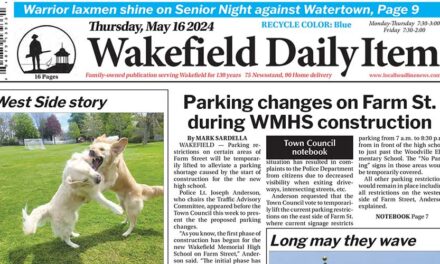Published April 29, 2020
By MARK SARDELLA
WAKEFIELD — Members of the town’s state legislative delegation offered their perspective on the COVID-19 emergency and the resulting economic shutdown during Monday’s Town Council meeting, which was held via Zoom teleconferencing and streamed live on WCAT’s Facebook page.
Senator Jason Lewis and Representatives Donald Wong and Kate Lipper-Garabedian talked about some of the steps that have been taken at the state level to mitigate the emergency and assist municipalities like Wakefield.
Lewis said that the effort at the state level has been two-pronged.
The first prong, he said, is to contain the spread of infection in order to limit the number of hospitalizations and save lives. He said that physical distancing and personal hygiene efforts appear to have prevented hospitals from becoming overwhelmed.
The second part is to try to mitigate the economic devastation and its impact on residents, small businesses, nonprofits and municipalities. Lewis highlighted state and federal efforts in that regard.
He talked about expanded unemployment benefits to cover independent contractors and the self-employed along with emergency funding for public health. The state has also granted relief to towns regarding election deadlines and issued moratoriums on evictions and foreclosures for both residents and small businesses.
The state has canceled the MCAS requirement for graduation, Lewis noted, and the legislature’s Education Committee will convene a hearing next week on the status of distance learning programs in schools.
Electronic notarization of real estate documents is now allowed and Lewis talked about state efforts to expand vote-by-mail and early voting provisions. He said that steps have been taken to protect vulnerable populations in nursing homes and strengthen the social safety net for low income families.
On the budgetary side, Lewis said that he did not expect to see any 9C cuts in state aid to municipalities this fiscal year. But he warned that FY 2021 (which begins July 1) is looking “pretty grim.”
The state effectively had to restart its budget process, Lewis said, in light of a projected $4 billion to $6 billion loss of revenue, which amounts to a 13-18 percent reduction. He predicted that the impact of this economic downturn will be worse than what was experienced in 2009.
Lewis maintained that the state has been prudent with spending over the years but will now have to tap its “rainy day fund.” He said that Massachusetts is counting on significant aid to states in the next federal stimulus bill, expected to be announced in the next 10 days.
Lewis said that the legislators hope to be able to provide guidance to cities and towns on the impact that the economic shutdown will have on Chapter 70 aid to education and unrestricted local aid as soon as possible.
Rep. Wong said that, in cooperation with MEMA, he was able to secure 100,000 masks from Taiwan for first responders to supplement the 100,000 that the governor obtained.
Wong noted that Round 2 of the Paycheck Protection Program, the federal governments coronavirus relief fund for small businesses, started this week. He also talked about a bill to protect people from eviction and another to provide seniors with tax relief.
Rep. Lipper-Garabedian said that the House and the Senate would work together to do what they can for Wakefield. She touched on some of the measures mentioned by Lewis and Wong and added that the state has recently enacted legislation that protects health care workers by limiting their liability. She also talked about support for local boards of health through a state action plan regarding health standards.
Lipper-Garabedian also referred residents to a list of resources on her web site that address unemployment, small businesses, food security, personal well-being, domestic violence and personal security.
Town Council Chairman Edward Dombroski asked what reimbursements the town could expect for funds spent of the pandemic.
Lewis said that it was important for the town to track all expenses that it is incurring. He said that due to the state and federal declarations of emergency, local expenses should be reimbursed but he was not sure of the timing.
In response to a question from Councilor Jonathan Chines, Lewis said that he expected that the state funding for the new roof at the Greenwood School was safe and expressed optimism regarding Massachusetts School Building Authority funding for the high school. He did, however, say that the impact of the current situation on MSBA funding was still not fully known as the agency is funded through the sales tax.
Town Councilor Mehreen Butt brought up a bill to collect COVID data that was passed by the House last week. She noted that this data is important for tracking the impact on minority populations, but pointed out that it did not include the LBGTQ community. She asked Lewis to see that it got included in the Senate version.
Butt also asked the legislators to make sure that any statewide legislation includes the homeless and those impacted by mental health and substance abuse issues.
Councilor Paul DiNocco asked about financial assistance for small businesses and sole proprietor businesses, which he said were having some difficulty navigating the system and applying for help.
Lipper-Garabedian urged any such businesses to reach out to her office for help. Lewis said that all three of the legislators should be seen as resources for both businesses and individuals at this time, calling it their “top priority.”
Dombroski pressed Lewis repeatedly about Chapter 70 funds and the smaller per pupil amount that Wakefield has historically received, compared to similar communities like Reading and Melrose.
Lewis did not respond directly but referred Dombroski to a PowerPoint presentation that the State Senator’s office sent out recently.
“The bottom line,” Lewis said, “is we’re doing all we can to protect as much school funding as we can.”





